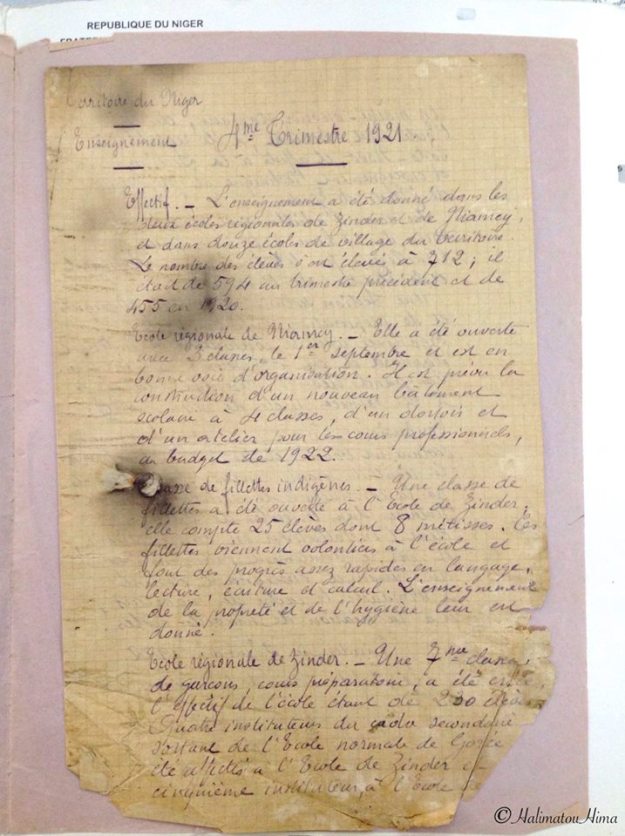We at CIHA Blog have previously written about the geopolitics of knowledge production about Africa, what more responsible research on the continent might look like, particularly when thinking about heavily researched communities on the African continent and the recent development of more ethical guidelines from an indigenous community’s perspective.
In our series on “What People Who Want to ‘Help Africa’ Should Know,” we highlight both problematic and helpful examples of humanitarianism in Africa. Today, we repost a blog post penned by Halimatou Hima Moussa Dioula, a PhD candidate in Development Studies as a Cambridge-Africa Scholar at the University of Cambridge (UK). Ms Dioula’s piece is a response to a problematic phrase she heard repeated by many researchers – Africans and non-Africans alike: “There is no data in Africa.”
Given growing awareness about the risk of data exploitation and simultaneous importance of ensuring data collected is community-owned and driven, humanitarian researchers and practitioners who want to “help” Africa would do well to reflect and foreground their own approaches, stereotypes about, and practices concerning data in/on/from Africa.
This first appeared on Halimatou Hima’s blog (find the original post here). We invite you to comment below with your responses and thoughts.
***
There is “no data” in Africa… really?!
This sentence drives me crazy, and I have heard it from many researchers – Africans and non-Africans alike. I recognise and acknowledge many of the challenges related to compiling, accessing, and storing (digitally and manuscripts) data in many African countries. These challenges must be addressed so that we do not lose valuable contribution to world’s history, mathematics, economics, etc. The challenges must be addressed so that knowledge seating at the periphery could also become mainstream.
During my doctoral research, I have conducted some work in the national archives of the country and found “treasures” that debunk the overly repeated notion, “there is no data in Africa”. These findings further question the validity of the transactional nature of some fieldwork, especially in non-western contexts. How can you find data (in any form) when some fieldwork lasts at times lasts one or two weeks? There is a wealth of data, often unexplored or seating at the periphery of conventional sources of knowledge. Some of the most reliable sources of information are the libraries within old traditional palaces where the works of the likes of Nana Asmau laid “dormant” to the rest of the world until uncovered by contemporary scholars.
The sad truth is that when repeated, this notion about the unavailability of data becomes a self-fulfilling prophecy, which impacts what we think we know and how we engage with certain places. This impacts even the very nature of what we teach and learn. If enough researchers repeat “there is no data in Niger”, for instance, then surely, it becomes acceptable when certain extrapolations are made… even if untrue.
Researchers need to stop being lazy and stop perpetuating single narratives about research in Africa based on their inability to search deeply, patiently, and differently. Furthermore, this is one reason why we need people with personal stakes to also research these issues because they would (hopefully) do it with their whole heart, settling for nothing but the very best, searching until they find (or at least try really hard), being patient with the challenges however long it takes…
To all researchers, especially venturing in a context that is not your own, before you utter the infamous “there is no data in [cite any African country]“, ask yourself some critical questions: Have I looked long enough? Have I looked in the right places? Did I ask the right people? Have I asked local researchers? Have I looked outside of what is usually considered a “source”? Am I doing justice to this community that has existed for centuries when I dismiss their forms of creating knowledge by saying ‘there is no data’? In what language(s) did I look for that data?

I took this photo from a file in Niger’s national archives. In 1920, there were 455 students in total in the entire country; 712 students in 1921. In 2010, there were 1,554,102 students in primary schools alone.
Featured image source: https://halimatouhima.wordpress.com/2018/07/19/there-is-no-data-in-africa-really/

Thank you for posting my blogpost here. I hope it generates discussions and changes the perspectives of researchers who don’t look hard/smart enough before they conclude, “there is no data”!